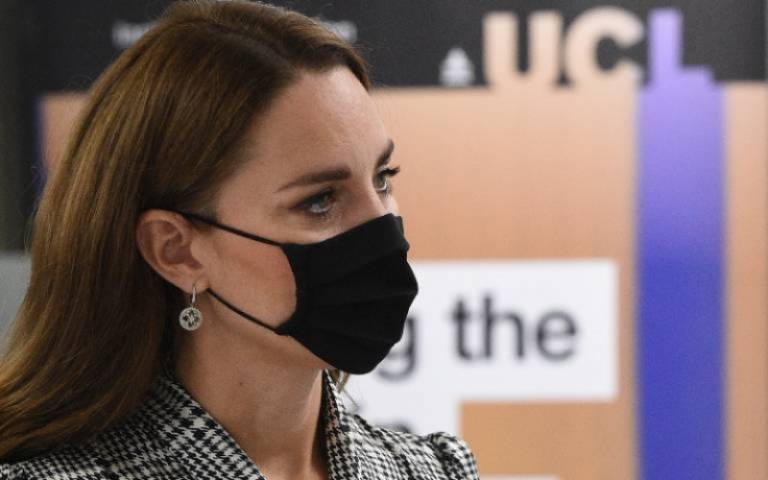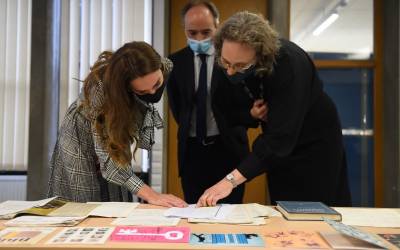Duchess of Cambridge visits UCL Special Collections
8 October 2021
The National Survey of Health and Development (NSHD) archive, an important resource for researchers exploring early years care and social history.

The Duchess of Cambridge visited UCL on 5 October to discuss a landmark early years study, co-led by researchers from the UCL Faculty of Brain Sciences and IOE, UCL's Faculty of Education and Society and in partnership with Ipsos MORI. The study is seeking to recruit over 8,000 families next year to track the development of children from the age of nine months to five years.

During the visit, the Duchess viewed material held in the IOE Archive, in particular the archive of the Centre for Longitudinal Studies (CLS) which holds the administrative records for four major birth cohort studies:
- The 1958 National Child Development Study (NCDS) – originally the Perinatal Mortality Survey.
- The 1970 British Cohort Study (BCS70) – began as the British Births Survey.
- The Millennium Cohort Study (MCS) – known as the ‘Child of the New Century’ (children born in 2000-2002).
- Next Steps – previously known as the Longitudinal Study of Young People in England (LSYPE), follows the lives of around 16,000 people in England born in 1989-90. The study began in 2004.
There were also items from the archive of the National Survey of Health and Development (NSHD), which is Britain’s earliest and longest running birth cohort study, beginning in 1946.
A ‘cohort study’ or ‘longitudinal study’ studies the same group of people over time, collecting data from them at regular intervals. Monitoring the same group of people throughout their lives means that cohort studies can highlight differences in health and development that arise due to life circumstances and experiences.
The findings from these studies have had long lasting impact on society.
The NSHD highlighted the importance of class on health and educational opportunities. The study’s director, James Douglas published the book The Home and the School in 1964, which demonstrated that children from more disadvantaged backgrounds were much less likely to go to grammar school, even when they were judged to be of similar ability. These findings contributed to the introduction of the ‘comprehensive’ school system in 1965.
A ‘Birth Questionnaire’ given to new mothers in 1958, included questions about pregnant women’s smoking habits. While not a standard question at the time, the responses allowed researchers to track the impact that smoking during pregnancy had on a baby’s birth weight, and how it continued to affect different aspects of a child’s life into adulthood. This led to a public health campaign to stop women smoking whilst pregnant, something which is now commonplace.
The archive doesn’t contain the research data collected by these studies, but instead administrative documents, blank questionnaires and interview booklets, as well as other items like the birthday cards sent out to NSHD’s study members.
Sarah Aitchison, Head of UCL Special Collections said:
““We’re delighted that we were able to use the archive collections held by UCL Special Collections to demonstrate the important history of longitudinal studies in the UK. Having the administrative archives as well as the data allows us to document the way the studies have evolved over time. These records allow researchers to see not just which questions were asked but why those particular questions were asked, and not others, and highlights the important link between medical and social science.”
Further information
For more information about the NSHD archive, please read Kurt Jameson’s article on Cataloguing the records of Britain’s longest-running birth cohort study.
Images
- The Duchess of Cambridge during visit to UCL. Credit: Pete Maclaine/Parsons Media.
 Close
Close

